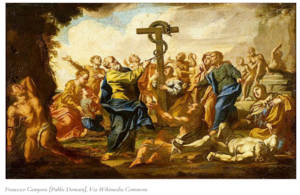Salvation: How Can I Be Saved?
Salvation: How Can I Be Saved?
Introduction:
The question “How can I be saved? Or What must I do to be saved? is central to Christian growth. To ensure that our salvation is secure, we must have a clear understanding of what the answer is to this question, which is the aim of this writing. We hope to do that first, by examining an interview Nicodemus had with Jesus as described in John 3:2-15 and secondly, by exploring what Jesus had to say to His disciples on the subject in Mark 16:15-16, and Matthew 28:19.
The Interview with Nicodemus:
The interview between Jesus and Nicodemus is significant in understanding Jesus’ teachings on salvation because it sheds light on what is necessary to be saved. In this interview found in John 3:2-15, Nicodemus approached Jesus secretly and acknowledged him as a teacher from God since “…no one could do these signs that you do unless God is with him.” Nicodemus was obviously sincere about knowing more about Jesus and His teachings. Nicodemus, being a respected religious teacher among the Pharisees who also understood the negative views many of the other Pharisees held toward Jesus, found it risky to be seen associating with Him. This may explain why he came to Jesus secretly at night.
Nonetheless, Jesus jumped right into the discussion by explaining to Nicodemus that to enter the Kingdom of God, one must be born again. (John 3:3) Here Jesus introduces two important terms “born again” and “Kingdom of God” both of which need to be explored to understand the answer to the question: ‘What must I do to be saved? We will discuss them in the subsequent sections.
You Must Be Born Again:
The term “born again” was new to the people of Jesus’ time and only appears three times in the New Testament (John 3:3, John 3:6, and 1 Peter 1:23). Jesus used this term to describe the spiritual rebirth that one must undergo to have a relationship with God and enter His Kingdom. This act of regeneration, renewal, or rebirth is not something that humans can achieve on their own but is solely the work of God. It involves receiving forgiveness of sins through belief in Christ and beginning a life characterized by faith, love, and hope. Jesus likened this rebirth to the wind, which: You can hear it but you cannot tell “…where it comes from and where it goes” (John 3:8), meaning it is a spiritual event beyond human comprehension.
The Kingdom of God:
The Kingdom of God was also new to the people of Jesus’ time but it is a central theme in Jesus’ teachings on salvation. While the phrase “Kingdom of God” does not appear in the Old Testament, the ideas of God as king and his kingly rule are pervasive. The Kingdom of God that Jesus announced, however, was a spiritual kingdom that fulfilled Israel’s hope and the covenant promises made to the fathers. It represents a new and final order that has arrived and is open to all who are born again and have faith in Christ. In other words, through belief in Christ, we can receive forgiveness of our sins and enter the spiritual Kingdom of God.
Born of the water and of the Spirit:
As the discussion continued, Jesus noticed that Nicodemus still had trouble understanding the term “born again”; it was then that He used another term, “born of the water and of the Spirit,” which Nicodemus would have been more familiar with. While some people separate this term into two parts, “born of the water” and “of the Spirit,” commentators agree they refer to one thing, the grace of the Spirit of God, with “water” meant figuratively and metaphorically. This term is another way of saying the same thing as being “born again” or “regenerated,” but in a language of Nicodemus’ time and culture (Gill’s Exposition of the Entire Bible).
The Lifting of the Bronze Serpent:
Nicodemus still had difficulty understanding, so Jesus used an example from Nicodemus’ time to explain the power of believing. Jesus cited the story of Moses making a bronze serpent and setting it on a pole in the middle of the Israelite camp to heal the Israelites bitten by the serpents that God had sent on them as a punishment for their murmuring against Him (Numbers 21:6-9). Jesus explained that just as the serpent was lifted up to provide physical healing, He (Jesus) would also have to be lifted up (on the cross) to provide spiritual healing. Whoever believes in Him “will not perish but have eternal life” (John 3:14).
About Belief:
Jesus emphasized to Nicodemus that even if he could not understand these spiritual things, he would have eternal life if he believed in Him. But what kind of belief is necessary for eternal life? The dictionary definition of “believe” often means accepting something as true, genuine, or real (Merriam-Webster.com/dictionary); however, the “biblical” definition of believe takes on the same definition as “faith”. Hence, it has a much broader meaning which includes three distinct elements: the intellectual element, the emotional element, and the voluntary element of faith. The “dictionary” definition represents the first element which is referred to as the intellectual element. The “biblical” definition extends beyond the intellectual element of faith to include an awakening of the soul to personal needs and a yearning for the benefits of Jesus’ redemptive powers (the emotional element). It also includes the third element which is a sense of trust that leads to a complete surrender to God for all things, both in the present and forever (the voluntary element). This broader definition is supported by scriptures such as Luke 18:8, Acts 6:7, 1 Timothy 4:1, 6:10, and Jude 3. These three elements of faith are considered progressive, with each preceding aspect logically leading to the next. According to Thiessen’s “Lectures in Systematic Theology” (1949, p.270-274) and McKenzie’s “Dictionary of the Bible” (pp. 267-271), commentators believe that a person’s faith is not complete unless it encompasses all three elements. Therefore, when we say we believe, we should mean it in the deepest sense.
Summary:
Nicodemus, a sincere inquirer, wanted to know more about Jesus and His message. However, he could not understand spiritual things because his mind had not been transformed. Jesus told him in the beginning that he needed to be born again, but because of his continuous inquiry, Jesus used various teaching strategies to help him understand. Jesus finally told Nicodemus that he must believe in Him to be born again. This interview revealed the importance of understanding the meaning of these terms and the historical context in which they were used. The discussion also revealed that to be “saved” (“born again”) means one needs to enter into a drastically new, trusting, and meaningful relationship with Jesus.
In addition to what was revealed through this interview, other Scriptures provide us with an even clearer explanation of “What must I do to be saved?” For that, let us look to Jesus’ instructions to His disciples when He commissioned them to evangelize the world for salvation.
The Master Teacher Instructs His Disciples:
In both Mark 16:15-16 and Matthew 28:19, Jesus instructed His disciples to “Go into all the world and preach the gospel to all creation.” He emphasized that whoever believes and is baptized will be saved, but whoever does not believe will be condemned. Baptism here means the external signature of the inner faith of the heart. It symbolizes a new relationship of faith, hope, and trust in Jesus, and it is a public confession of that relationship. Baptism is, therefore, no longer just a symbol of repentance, but a “…token that those who received it were brought into an altogether new relation to Him who was thus revealed to them.” (Ellicott’s Commentary for English Readers).
Conclusion:
In conclusion, the answer to “What must I do to be saved?” is that one must accept Jesus’ teachings on salvation which requires embracing the concept of being born again, having faith in Jesus, and entering into a transformative relationship with Him. Salvation is a gracious gift from God, received through belief in Jesus and symbolized by baptism. These teachings emphasize the profound spiritual transformation and the new life that salvation brings to individuals. By following Jesus’ teachings and placing our faith in Him, we can experience the fullness of salvation and enter into a meaningful relationship with Him. Entering a sincere relationship with Jesus is the key to entering his spiritual kingdom—the Kingdom of God. (John 3:3)
See the related post for additional information: http://What Must I Do To Be Saved?



